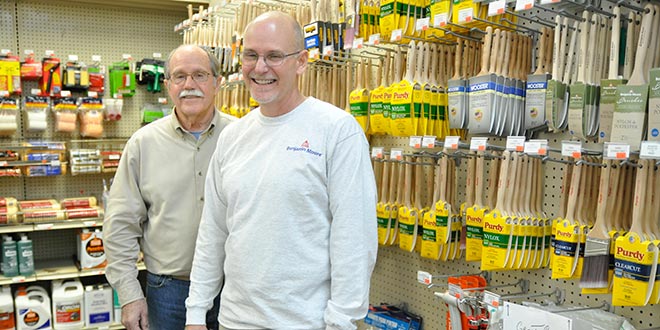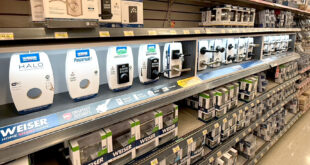To view a PDF of this story, click here.
By Jesse Carleton, jcarleton@nrha.org
How to Earn the Paint Sale
Curt Munger knows that just being a retailer with a specialty paint store doesn’t mean he will get a flood of customers. He has to earn each customer’s business, every day. How he earns that business is different today than it was a few decades ago when his father, Marvin, opened Munger Paint & Wallcovering in Warr Acres, Oklahoma. In order to remain the retailer of choice, Curt and his father had to respond to the changing competitive landscape and do what they do best—provide good customer service. Here are a few of the ways they provide that service.
1. Talk Value, Not Price
Munger Paint is within an easy drive from two big-box home improvement stores and three specialty paint stores. Some of those retailers engage in price wars, but Curt Munger says advertising can be misleading, so it’s important for him to educate his customers.
 “It’s important to explain the differences in paint,” he says. “I need to explain why the most expensive can of paint at my store is higher than the most expensive can at the big-box. It all has to do with quality.”
“It’s important to explain the differences in paint,” he says. “I need to explain why the most expensive can of paint at my store is higher than the most expensive can at the big-box. It all has to do with quality.”
He’ll explain the different features of a premium paint, such as how much resin is in the paint versus water content. Customers need to know they may not be comparing similar products.
2. Offer Customers More
While Munger admits he’s scaled back his wallpaper sales since they peaked in the 1980s, he still keeps this niche because it remains a need among a segment of his customers. And, there are few other retailers that sell it. Keeping this important niche allows him to offer his customers more than the average paint store, which is why he’s added a few hardware items to the store. He carries items most paint stores don’t carry but which most painters need, such as light bulbs, hand tools and a few cleaning supplies.
3. Educate the Consumer… and the Pro
When Munger first entered the business, the professional painter was a fairly low-maintenance customer. Pros purchased a high volume of product and knew exactly what they needed to finish the job. That has been changing, he says.
He’s seen more painters who are going pro, or hiring themselves out for work, when they only have a small amount of experience.
“We spend almost as much time explaining to pros how to do something as we do our retail customers,” he says.
Conversely, the typical walk-in consumer may already know a lot about the project they’re currently tackling.
“Walk-in customers may actually be over-informed because of what they’ve found on the internet. They may need help sorting out what can sometimes be conflicting information about how to do something,” he says.
Munger finds that helping customers gain first-hand knowledge helps, even if it means handing them a brush and opening up a can of paint so they can see how the paint applies.
4. Service is More Important Than Ever
 With competition all around, Munger says it’s more important than ever to provide outstanding customer service. He wants every customer to get personal attention through every step of the process.
With competition all around, Munger says it’s more important than ever to provide outstanding customer service. He wants every customer to get personal attention through every step of the process.
“When you walk in our store, the same person will wait on you the entire time. All of our employees can mix paint, and everyone can work the cash register,” he says. “This allows employees more of an opportunity to establish a relationship with the customers.”
5. Don’t Try to Chase Everyone
Sometimes, achieving success in selling paint means targeting a specific audience, and then finding the best way to meet their needs. Munger sells paint to anyone, but he doesn’t believe he needs to pursue the business of all customers in his market.
“The bulk of our sales go to contractors, but we’ve intentionally not chased the new home market,” he says. “That market typically offers low margins and requires little in the way of customer service.”
He lets that business go to his competitors, as he would rather sell higher-quality products and maintain the store’s reputation for providing expert product knowledge.
 Hardware Retailing The Industry's Source for Insights and Information
Hardware Retailing The Industry's Source for Insights and Information






